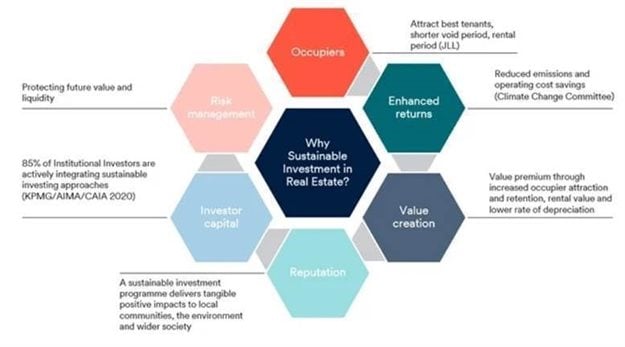Climate change and its potential costs to humankind made headlines again last week. What was new was the clarity of the message putting changes to the planet's climate down to the human race.

Source: Gallo/Getty
The findings of the Intergovernmental Panel on Climate Change (IPCC) place climate change firmly on our doorstep, and has demanded a global response. Indeed, the opening line in the assessment of the climate now could scarcely be clearer.
“It is unequivocal that human influence has warmed the atmosphere, ocean and land.”
As real estate investors, we are uniquely empowered to make meaningful change. 42% of the UK’s carbon footprint and 38% of all CO2 emissions globally come from the built environment.
However, some investors believe that tackling carbon emissions from real estate will be costly to returns. We believe the opposite is true. Buildings with better efficiency ratings typically attract higher rents, lower running costs and are more appealing to tenants and can lead to overall better returns.
The global commitment
The term "net zero" is becoming a global rallying cry, frequently cited as a necessary step to successfully limit climate change and the devastation it is causing. A host of countries have announced major commitments to cut their carbon emissions, promising to reach net zero in the coming years.
Practically every country has joined the Paris Agreement on climate change, along with companies, cities and financial institutions with the objective of reducing emissions to net zero by mid-century.
Here in the UK, the government has committed to a 68% reduction in carbon emissions by the year 2030 and net zero by 2050. For real estate investors, this is a very present consideration.
According to data from the Loan Markets Association, 75% of the current UK building stock is energy inefficient. If the UK government is to hit its target, a significant contribution from the real estate industry is clearly required.
Navid Constantino 19 Aug 2021
The right direction
The main driving force for change will be made at a national government level through legislation and regulations to reduce emissions. However, the UN’s Global Compact and Act Now Campaign are initiatives aimed at raising awareness at company and employee levels.
The Climate Pledge has taken this a step further. Co-founded by Amazon, the Climate Pledge calls for companies and organisations to be net zero across their businesses by 2040, with a bold goal of net zero carbon ten years earlier than specified by the Paris Agreement.
More than 100 companies have now pledged across 18 industries to measure and report carbon emissions, implement decarbonisation strategies and neutralise any remaining emissions with credible offsets.
As a result, more and more companies are setting ambitious carbon and sustainability goals around their businesses and the space they occupy. Real estate advisers JLL report that more than ~14 million square feet of central London office stock which have lease events before 2030 are currently occupied by companies who have made a commitment to net zero or have signed up to “science-based- targets”.
Science-based targets seek a clearly-defined path to reduce emissions in line with the Paris Agreement goal. This clearly demonstrates the increasing demand and need for highly sustainable buildings within central London.
Victor Ongoma 12 Aug 2021
What’s in it for investors?
JLL has examined leasing activity across central London and explored the relationship between rental values and BREEAM. BREEAM is an established method of assessing, rating, and certifying an asset’s environmental, social and economic sustainability performance. The study found that leasing activity for new, grade-A office buildings in central London with a BREEAM rating of “very good” or higher, achieved on average 10% higher rents than those without a rating.
So-called leasing “velocity” also improved, with lower vacancy rates of 7% - compared to 20% - for those rated “very good” 24 months after completion. Whilst the results are currently monitored for new builds, we expect this trend will follow through to properties refurbished to grade A.
The latest research from JLL has revealed the tangible financial benefits that sustainable office buildings can deliver and investors who target a sustainable strategy are rewarded through a combination of higher rents, stronger leasing velocity and higher occupancy rates throughout the cycle.
On the flip side, it is becoming increasingly clear that with the rapid expansion of sustainability in real estate investment, ‘doing nothing’ is not an option. The value of your asset – no matter where it is or what type – will be impacted by increased obsolescence or stranding of properties that do not meet occupational, investor and legislative sustainability standards.
Investor appetite for sustainable real estate won’t fade
Covid-19 has accelerated a fundamental behavioural shift - and one which will define the asset management industry of the future - the shift towards sustainable investment.
Two years ago “ESG” was, in many places, just a “tick-the-box” exercise. It was often there to satisfy the requirements of progressive northern European investors, and it used to be enough to be a signatory of the UN Principles of Responsible Investment (PRIs). We are now seeing an entirely new expectation level which is akin to a global revolution.
The value of ESG in real estate

Source: Schroders, 2021, "Valuing Net Zero and ESG for Offices", JLL April 2021
click to enlargeSustainable Finance Disclosure Regulation (SFDR) was adopted in March 2021 as the EU regulatory standard for sustainable investing, and both private and institutional investment decision-makers have fully embraced the need for action to avoid a global climate crisis and to overcome rising inequality everywhere. We see this as a huge opportunity for private markets, given their inherent ability to truly control assets and drive impact.
In our view, real estate investors are in a position to drive positive change through the sector to contribute towards the 2030 target. ESG objectives and investor incentives are entirely aligned and there a number of financial benefits that a sustainable investment strategy can achieve during the investment cycle.



























